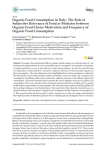Castellini G., Savarese M., Castiglioni C., Graffigna G. (2020). Organic food consumption in Italy: the role of subjective relevance of food as mediator between organic food choice motivation and frequency of organic food consumption. Sustainability, 01/07/2020, vol. 12, n. 13, p. 1-15.
https://doi.org/10.3390/su12135367
https://doi.org/10.3390/su12135367
| Titre : | Organic food consumption in Italy: the role of subjective relevance of food as mediator between organic food choice motivation and frequency of organic food consumption (2020) |
| Auteurs : | G. Castellini ; M. Savarese ; C. Castiglioni ; G. Graffigna |
| Type de document : | Article |
| Dans : | Sustainability (vol. 12, n. 13, July 2020) |
| Article en page(s) : | p. 1-15 |
| Langues : | Anglais |
| Langues du résumé : | Anglais |
| Catégories : |
Catégories principales 08 - ALIMENTATION ; 8.1 - Consommation Alimentaire. ComportementThésaurus IAMM ALIMENT BIOLOGIQUE POUR HOMME ; CONSOMMATION ALIMENTAIRE ; COMPORTEMENT DU CONSOMMATEUR ; ALIMENTATION DURABLE ; MOTIVATION ; FACTEUR PSYCHOLOGIQUE ; ENQUETE AUPRES DES CONSOMMATEURS ; ITALIE |
| Résumé : | Nowadays, the problems that afflict our planet (climate change, loss of biodiversity, etc.) are leading to the implementation of a more sustainable type of consumption. Increasing the consumption of organic products is a way to face and try to solve these problems. In order to reach this aim, it is important to understand how consumers’ subjective relevance of these products impacts on their consumption. The recent literature, in fact, highlighted how food consumption is salient for the individual to express their identity and life orientations, even more in the case of organic food consumption. Nonetheless, little is known about how subjective relevance of food affects organic food consumption. The present research aims to measure the role of subjective relevance in organic food consumption. Data were collected with a self-report questionnaire that was filled out by a sample of 964 Italians, representative of the population. We used structural equation modelling (SEM) and the bootstrap technique to test the hypothesis. The results show that subjective food relevance is a mediator between the motivations of organic food consumption and the frequency of consumption of it. This research points out the necessity to study consumers in a wider way, using communication that emphasizes the role that these products have in satisfying the psychological needs of consumers. |
| Cote : | En ligne |
| URL / DOI : | https://doi.org/10.3390/su12135367 |







